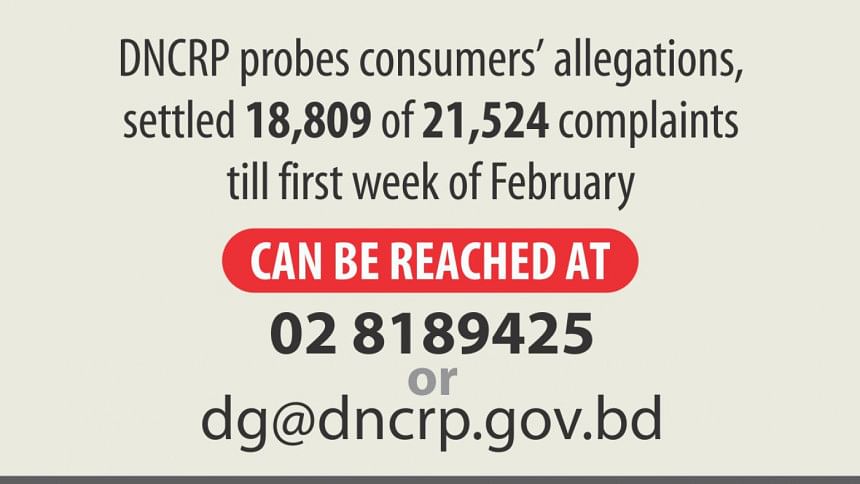Consumer Rights Protection Body: Laudable job with limited resources

Every month since 2016, Mamtaz Begum, a house help in Khulna city, deposited Tk 100 under a 12-year Deposit Pension Scheme (DPS) of Popular Life Insurance.
Before the scheme's maturity, she began notifying the company of her intent to encash it. Afterwards, she submitted the papers to cash her gain in February last year.
The officials of the insurance company, however, began to redirect Mamtaz from one place to another, instead of clearing her dues.
Mamtaz waited for the cheque for almost a quarter of a year before she was suggested by well-wishers to lodge a complaint with the local office of the Directorate of National Consumer Rights Protection (DNCRP).
It was a last-ditch effort.
She submitted her complaint to the DNCRP Khulna office in October.
Around a week later, a phone call informed Mamtaz that her cheque of Tk 17,300 was ready to be collected.
"I couldn't have realised the money without their [DNCRP] intervention," said a grateful Mamtaz.
Popular Life Insurance Managing Director and CEO BM Yousuf Ali could not be reached for comment on the issue.
Mamtaz's story is one of thousands that the DNCRP generates on a regular basis. The directorate is also fast bringing back consumer confidence in a country widely lacking it.
The DNCRP -- which is under the commerce ministry -- began its journey in 2009 against the backdrop of widespread allegations of disregard for consumer rights.
Since its inception, it has resolved 18,809 cases out of 21,524 complaints it received until the first week of February.
Sultana Afroz, another consumer who was wronged, happened upon the DNCRP's functions during a news broadcast on TV.
At the time, she was looking for a way to file a complaint against a spectacles seller at the capital's New Market who had sold her broken frames.
She discovered the defect after returning home. When she informed the seller, he refused to change it or give her a refund.
But after filing the complaint, the DNCRP looked into the matter and then found the fault was at the seller's end. They ensured that he compensated Sultana.
“I am happy that we have a consumer rights office. This was urgently needed in our country where business ethics is almost absent,” said Sultana.
She urged the government to ensure more publicity about the Consumer Rights Protection Act and the directorate, saying it would make “businesses conscious on how to deal with customers and refrain from cheating”.
Like Sultana, consumers who have gotten redress from the directorate have said more awareness of its existence was required.
As more people become aware of the DNCRP's activities, the number of complaints has started to grow, from 6,140 complaints the previous year to 9,019 in 2017-18.
The DNCRP, however, is yet to be fully equipped.
Currently, the body has some limitations -- for instance, its mandate excludes real estate. And the DNCRP has 191 people against a requirement of 240.
The agency has offices in every district but only by name as many of those do not have any staffers, said officials.
The DNCRP has officers in 48 districts of which 16 districts are covered by giving additional responsibilities to different officers, instead of them working exclusively for the directorate.
The directorate has 79 officers in total, including the DG, to protect rights of consumer up to the grass root level.
Despite the limitations, it continues to do good work.
But not enough people know about the directorate's functions. The complaints mostly come from capital city dwellers. The number is fewer at district level and even fewer in upazila and union levels.
This is something that is being worked upon.
DNCRP Director General Md Shafiqul Islam Laskar said his office is going to develop a mobile app to enable consumers to file complaints instantly. We have already floated tender to develop the app,” he said.
Consumers will get confirmation about receipt of their complaints. If there is any deficiency in complaints, they will be informed instantly. They will also know the date of hearing of their complaints through the app, he said.
Meanwhile, the prospect of redress and the provision for getting a part of the fine slapped on the sellers have encouraged consumers to file complaints, according to officials.
Anyone can file a complaint against anti-consumer activities, such as selling goods and services at prices higher than the maximum retail prices mentioned; for adulteration, and failure to supply goods and services as promised.
A consumer has to file a complaint in writing to the DNCRP and drop it off, or send it via post, fax or email.
The complainant has to provide the office with his or her detailed address and mention profession. No fee is required, according to the DNCRP.
The complainant gets a portion of the fine slapped on the seller or service provider as compensation for the trouble faced.
Asif M Saleheen filed a complaint with the DNCRP in December 2017 against Novoair for not allowing his paralysed father board its aircraft even though they had bought the ticket mentioning that he needed a wheelchair to move.
DNCRP fined the airlines Tk 50,000 after investigation, said Asif. He was refunded and received 25 percent of the fine as per the Consumer Rights Protection Act.
When reached out for comments, Novoair said they regretted not being able to carry the passenger. The ATR 72-500 aircraft was not equipped to safely carry a passenger completely paralysed, said Mesbahul Islam, head of sales and marketing of Novoair.
Cases of consumer deception have been found in different sectors, including food, medicine, and medical services, according to DNCRP officials.
Consumers Association of Bangladesh President Ghulam Rahman said the DNCRP should be properly equipped.
“They [DNCRP] are doing a commendable job despite the limited manpower and resources,” he added.

 For all latest news, follow The Daily Star's Google News channel.
For all latest news, follow The Daily Star's Google News channel. 








Comments